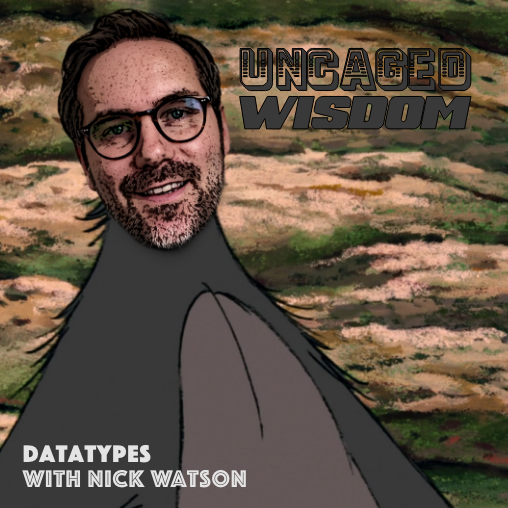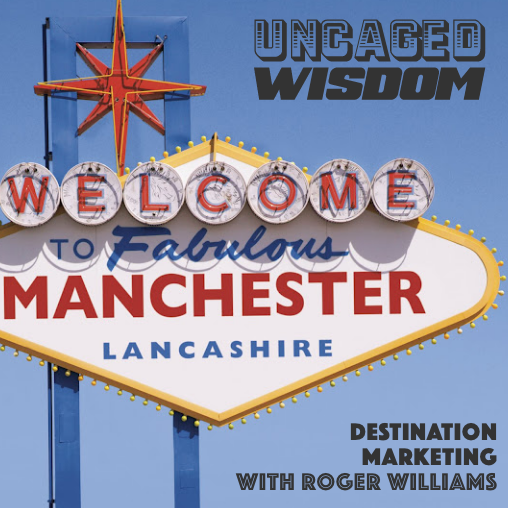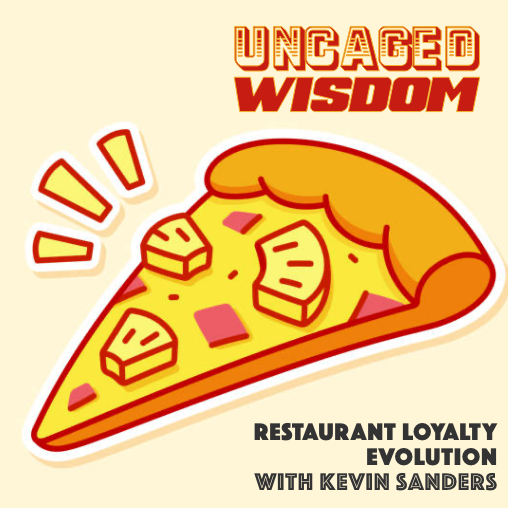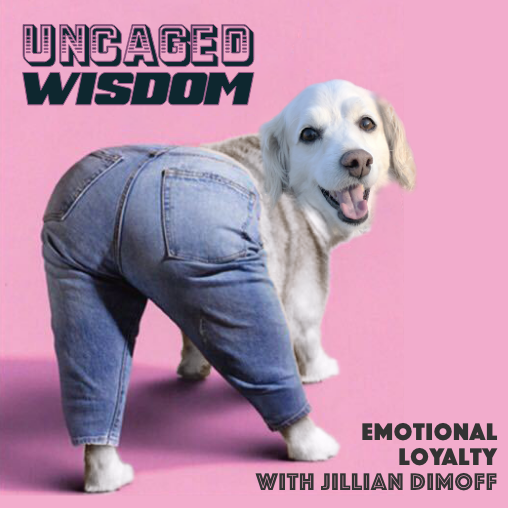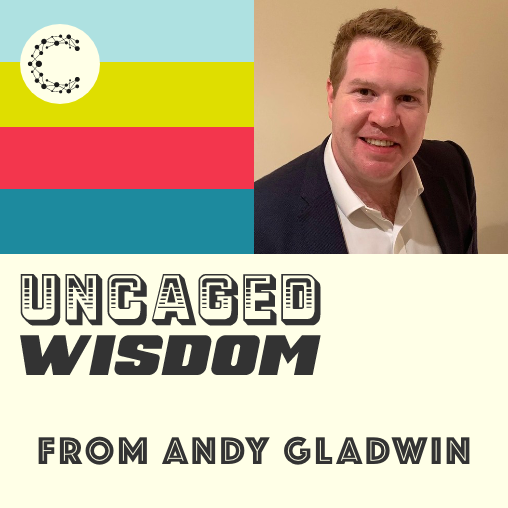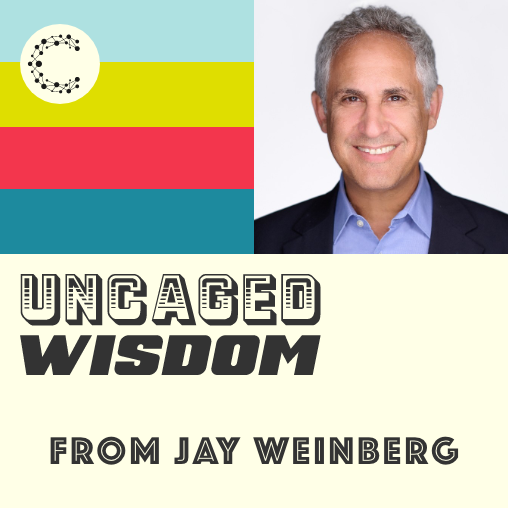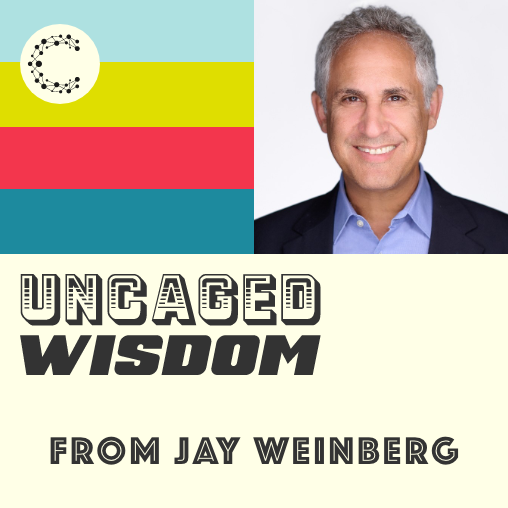Deep Dips: Datatypes, featuring Zero-Party Data w/ Nick Watson
- 0.5
- 1
- 1.25
- 1.5
- 1.75
- 2
Jennifer Yeadon: Play us something, and then that could be our intro.
Julian Bracey-Davis: Oh, here it goes. Let him warm up.
Intro/Outro: Uncaged Wisdom: Deep Dips. The podcast where we take a quick but deep dip into the world of relationship marketing.
Nick Watson: I'm not pressing the pedals.
Julian Bracey-Davis: Back again. This time joined by none other than Nick Watson. Today's Deep Dip conversation piece is data types with, I'm just going to say it up front, a bit of a heavier slant towards zero party data. So firstly, Nick, thank you for joining us again.
Nick Watson: Thanks for having me again. I'm surprised you invite to be back, it's an honor.
Julian Bracey-Davis: So yeah, we're going to go into data types in a minute. But Nick, you'll like this, being a big music man. Our new beginning feature to each episode is sympathy for the devil's advocate.
Speaker 1: The worst advice is advice.
Julian Bracey-Davis: So Nick, I hope you're ready for this. I'm going to read a statement out to you and we're just going to have to roll with your guttural reaction to it. Zero party data is a bullshit term that is being used to sound privacy friendly.
Nick Watson: Well, it's funny the reactions to it that we get. Because the first reactions we often got were from people from the media landscape who had a lot of vested interest in third party data because that was the core of their offering and massively times changed there. But the other one was that people thought there were enough terms already, and why would we have more terms? And frankly, why does anyone come up with any term in the first place? Someone had to invent the name first party data, and second party data, and third party data. So why not create another data type and shine a light on it? Which is what Forrester did. And I think is it important to a marketer today? 100%. Is it actually being privacy respectful? Yes, 100% it is. So it's not bullshit if it's actually doing what it's supposed to do. And it's about ensuring that marketers and advertisers can navigate the new world, the new privacy landscape. And I think those people who embraced it are doing incredibly well now. And let's be honest about it, I see the term everywhere now, so it definitely has picked up some traction. And we really truly believe at Cheetah it's a really, really important type of data. So whether you call it zero data, or whether you call it preference data, or whether you call it self- reported psychographic data, it doesn't matter. It's about what it is and what it's going to do for you as a marketer.
Julian Bracey-Davis: I don't want to spend too much time on the different types, but I do want to just quickly run through them. Third party data, people know it as data that comes from external sources to the organization itself. It's data that they can bring in and use. We always sort of knew in the back of our mind that perhaps where that data was coming from wasn't the most ethical and the best places, and how it was then new used by an organization to take advantage, you could say, of potential customers. The second party data, we skip over that. It's interesting, but let's see that for another day. First party data. So first party data and zero party data, what are some of the differences?
Diva Renton-Roderix: Yeah. I'd say with first party data, obviously it's crucial, but it's still often inferred data. It's not preference data, it's not that explicitly permissions asked data that you can use to make important decisions about marketing communications. So really that I see the crucial difference, zero party data is it's that preference data.
Julian Bracey-Davis: Nick, let's focus on that a little bit more. So yeah, I mean, you are in a lot of meetings where you're talking about data types and the journey from, let's say, weaning off third party data towards what we want people to get to is zero a party data. But from your experience, where does some of the confusion lie?
Nick Watson: People now understand that the third party, particularly cookie based landscape, is changing and therefore they need to take some action. The thing to remember is that the scale that third party cookie based data was giving a marketer or an advertiser is something that's difficult to get again. In fact, they were being quite granular in some of the ways that they were able to re-target as well. Whether that data was true, whether it was right, how it had been collected, is another question entirely. But they were getting big statistics of reach and engagement, and some other type of KPIs that we would get through advertising means. And therefore people are then kind of thinking," Well, how do I convert that? And how do I move towards a first party data strategy if I didn't have one to replace what the third party cookie did?" And the answer is it doesn't necessarily replace it because they're two different things. And the cookie landscape as it is today, or what's the re- versioning of this, will at some point work its way out and there will be something that is an equivalent. And there is things that are the equivalent that allow you as a marketer to reach people that you don't really know, which is what third party cookie was doing. But it's at that point that in the past then people would do that, they'd display an ad and it would be passive. They'd get nothing in return and they would never encourage anyone to give their data up. And I think that's the strategy that needs to change. And that's therefore why having this movement towards first party data and then zero party data too becomes more important. Obviously every vertical is different as well, there are some where as soon as you've got a purchase a lot of retail brands have got an email address and that's done. Sometimes they haven't got the opt- ins, admittedly. But then others like the FMCG CPG organizations we work with, they've been incredibly focused on cookie based data only, and they really haven't had any other way to connect directly with consumers. So this has been a huge transition for them as well. And if you then move into zero party data, well, this is like the icing on the cake. It's like the moment that you can get a name and an email, and a permission to communicate to someone. Also, attempt to get some of this preference data, so that the next time you talk to them you can use that data to have a more personal connection with them. Which is more likely to elicit a better response, or more likely to get them to buy a product from you, or whatever else it might be that you're looking to achieve
Julian Bracey-Davis: For the lay person just trying to get their head around it, where does first party data end?
Nick Watson: First party data generally can be across a whole spectrum. It can still be, I think Diva touched on it, it can still be observed. And so you can get first party cookie data, which is powerful. And so many retailers are using that to use as their personalization strategy. The difference, I guess, with the zero party data is that you have explicitly asked for that data and you have somebody responding with that, that you don't therefore need to infer what they're saying. Because you asked them a direct question, you've got a direct answer. Therefore, you don't have to wade through tranches of first party data that's been observed or that you then infer from those observations of tracking history, as such like on your site, you can then have a pool of data. That's going to give you those preferences nicely, cleanly categorized out of the box because you've set it up in that way, to ask those questions and to specifically try and obtain that type of data. It's very, very difficult to make insight from data across someone's browsing history if they've browsed a lot through your website. They are obviously classic things that are done that are effective, like abandoned basket and other things like that that work. But in a more general sense, if somebody hasn't added anything into their basket, how easy is it to pick up on which is the thing they were most interested in out of all the things that they clicked on? Why did they click on the products they clicked on? Because you might have funneled them towards it because of your site optimization, for example, but actually they didn't have an interest and they bounce back off again. So the more chance you have to ask them directly, and it's that bit about it, the self- reported direct part of it, the more that you unlock the value of this zero party data and first party data. And that being self- reported rather than observed.
Diva Renton-Roderix: The thought from my side would be that the behavioral data is better than just looking at demographics. Probably all seeing the Prince Charles Ozzy Osbourne example, if you look at just personas that could lead you down the wrong path. But zero party data definitely trump's behavioral data because people aren't static, they have intentions, desires, what they're going to purchase. And that isn't a static piece. And I think that's why it's so important as well.
Julian Bracey-Davis: Could you elaborate a little bit more on Prince Charles and Ozzy Osbourne being in the same bucket together? Because this is either a very wild party or something that we need to tell Interpol about.
Diva Renton-Roderix: Indeed. So if you look at them on paper, they're both male, born in the same year, raised in the UK, married twice, lives in a castle, and wealthy and famous. So you could bucket them into the same communications, but I think you've got two very different personalities there.
Nick Watson: And the difference there of knowing how to market to Ozzy versus Prince Charles could have been a simple couple of questions. Prince Charles likes environmental issues, and rewilding, and organic produce, and maybe Ozzy does as well. But Ozzy is more likely going to be into rock music and maybe not partying anymore, but they would've been in the past, in events or whatever it might be. And I think that those couple of questions immediately allow you to completely diverge your decision making on how to personalize to each of them and how to make that more personal beyond segments of demographic data, exactly as Diva said. Which they're big old pots to put people in, people are very, very different. But if you know as a brand what it is that's important to you to use from a personalization perspective, that is really powerful. And that doesn't have to be super complex in any way, shape or form.
Diva Renton-Roderix: Yeah. So this term zero party data, we're seeing this obviously pretty widely spread now. We've actually been talking about this for around a decade. Before there was a term we've been encouraging our clients to collect this preference data. And also trying to convey that it's not that difficult to get started, you just need to plan out what are the, say, 20 things that you need to know from your customer?
Nick Watson: The getting started and starting from a small point is really important. Because there probably are a few key things that most brands would, if they thought about it, that if they asked their customers or prospective customers these questions, they would better be able to personalize, or recommend, or communicate with them. Whether that is about things from a clothes retailer, like fit and style preferences, or whether it's about your personal flavor taste preferences from a food based organization, through to things to do with your situation relating to, I don't know, financial situation. Not necessarily what money do you earn, but what type of spender are you? How are you saving for your future? And things like that. Like what type of personality trait are you? And I think those are the things that most brands could start with and see an immediate impact. And that's what we always just try to encourage, is taking those and immediately using them so that the business can see the value of asking these questions and immediately be seeing some results. And it doesn't have to be big things to change from a personalization perspective. It can be content on site, it can be a subject line, it can be a personalized offer or a recommendation. But all of those are quite immediate things that you can show someone the value of the data that they've provided to you and how you are using it to give them a better experience. Obviously the net result of that for any brand is you want to sell more product. And everybody knows that, that's okay. But if they might use a brand and they've engaged with you, then they'd rather you also help them to find the right brand or the right product within your portfolio for them, for their needs. Or to educate them about why perhaps your product is going to be the best for them over a particular competitor.
Julian Bracey-Davis: I think one of the frustrations we've had working in this for a decade, Diva as you said, we've been talking about this for 10 years. That's what we've been doing, is trying to help brands collect information consensually so they can use it and better market to people. You've been in the room, Nick, a lot with people having these types of conversations. Just off the top of the head, I don't know if there's an example of a meeting you've had where you saw the penny drop for people? That before they were like," Oh no, we got all the data in the world. We don't need any more data. Stop trying to make us collect more data." And then they finally got what you were saying and they realized why it was so important. Is there any sort of little story you can help illuminate there?
Nick Watson: There's definitely a couple of years of stories. The first is a major CPG organization when we spoke to them not, but I think it was maybe four or five years ago now. They said to us when we spoke to them," We don't need to collect our own data. We do everything through Facebook." And at that time it was a valid strategy. We didn't believe in it because we saw the potential pitfalls of it, but a lot of brands were literally just doing everything through Facebook. All of their communication, all of the data was owned by Facebook, and they just bought audiences, and they got people, and you could do things organically. Things have changed, massively changed since that time. And a pleasing thing was to be able to go back to, okay, completely different individuals within that same organization, have a conversation. They had built a whole strategy in that organization around first party data collection. And they were looking for us to help them to deliver upon that strategy, which is what we have since done. And we've struck up a relationship, a very successful one, with them. So that's an interesting thing where times change, but you can't get past the fact that if you own your own data you are never going to be in that sticky situation that someone turns the tap off, or changes your access, or owns that, or suddenly makes you pay for something that you weren't paying for before, or whatever it might be. So, that's one key thing. And then the second one, I think you touched on it, Julian, is this thing I've heard millions of times. And it sends me barmy. This thing about," We've got so much data, we don't need anymore. Why would we collect any more data?" And most of the time when people say that, it depends on what sort of mood I'm in, if I'm in a pugnacious mood I might challenge them on it. I basically say," Hey, okay, how are you using that then?" And most of the time the people that say," Oh, we're working on it." And they're working on it because it's an absolute minefield of huge amounts of data. Actually you're at a bind, it's not easy to do anything with them. You then need to employ data scientists from MIT to make decisions on how to use that data. You then need platforms that allow you to crunch that data. And even if you do that, most of the time that data's being crunched in a data warehouse somewhere, and the average marketer can't then use that to actually action or deliver upon any of this stuff as well. So this is this thing we've heard so much. I definitely use the Amazon example of this, people have always talked about how much data Amazon have got. Now, they've got that data and that's powerful for them to create their own product ranges. But from a marketing personalization perspective, useless. You can't market to me, Amazon, because I've bought so many different things across a whole range, including gifts, that it's useless. It doesn't mean anything anymore to... Yes, I'm sure they have some personalization and segmentation there, but it's almost they have so much across so much of a range of my life that it doesn't become useful anymore. If they were to ask me a few key questions about the fact I've just moved house, I've got a family, they could at least start to put some things in some buckets. Rather than," You just bought that. I'm going to randomly try and sell you the same product again with a different brand." Well, why would I want that? Or similar related products. So, that's that there. And I did have a light bulb moment with a very big data led organization who I've always believed could be looking at data in a different way with their customer base. And they suddenly had this moment whereby they realized one person on the call said," We've got all this data. We don't need more data." And the other person actually called out within that meeting, I didn't have to say anything,"Yeah, but we don't use it." I actually did do a little hallelujah. And I told them why I was so excited that they were saying this. And we are moving forward to help them to start collecting some data and offer more. And, I mean, in their instance here it's working with their partners, to offer value to their partners through collecting some data that can be useful for their partners to help market to the individuals within their program, their customers. So if this is the thing for me, if I hear anyone, or if anyone out there has ever said that in a meeting, then you need to have a good, long, hard look in the mirror and realize what's wrong with either your data strategy or your technology stack, frankly, as well, or your organization and the silos that you've got that you need to change in order to not have to give that answer if anyone asks you about data collection again.
Diva Renton-Roderix: With legislation over the last few years, and how I think that maybe sped up zero party data and its usage. But how have you seen that change? How brands are thinking about this?
Nick Watson: One way has accelerated it because there's been a need to have to own your own data, because the regulation says you have to do things in a certain way and you have to treat data with respect. So, that's been brilliant. And another way has kind of hamstrung people. They've been scared by the regulation and they haven't done anything. And I think there's still a battle to be won across organizations to say," Don't be scared of the data. If you are clear about data, you have clear privacy policies, terms and conditions. You have good processes for deleting data if it's no longer to be used, and you have an easy way for people to facilitate doing that, then you shouldn't be scared of that. And what you should do is make sure that your program builds in the ability to collect that data and then take an action with it that showcases why that was okay to use that data." Builds trust, and it's all about the trust. So don't be scared to do it, but just ensure that when you do do it, that you have the policies in place. And they're not difficult policies either by any means. All organizations, software organizations such as ourselves, will have been through loads of work to ensure that we are completely compliant. So your data's going to be in a safe place. And then what you just need to do is work on the legal considerations on your side, create your strategy and your policy of how long you want to maintain data for, what you want to with it. And then get on with it. And there are millions and millions of people out there who are willing to give up data with a brand that they like, and they won't suddenly report you to the authorities if you make a slight even misstep with it. You just own it and apologize, and then move on. And don't be scared because this data is really powerful, and it's much better to own it, as we said before, than to go back to another data set where you are one step removed and therefore no risk, but actually you're not going to get the rewards from it in any way, shape or form. And from an arm's length and a distance you're probably likely to annoy your customers or prospective customers using that data instead.
Julian Bracey-Davis: I think between the group here we've made a very, very clear case of setting out different data types, focusing on why zero party data is important and why it's different. And why actually it should be at the heart of any marketing strategy to really genuinely preach relationship marketing and personalization, and talking to your customers one- to- one. To end, I am playing the role of a confused client prospect. Where do we start? How do we start? I understand everything you've just said to me, understand it, but I'm still a little bit confused. So my simple question to you is how do we get the ball rolling? What are the most important things for me to think about? And are there any simple tricks that I could do the baby steps?
Diva Renton-Roderix: The recommendations that we've been making to clients for a few years now is start with, what are 20 things that you would like to know about your customers this year? And then as you're planning out your activity just include one or two of those questions into what you're already asking them. So you're already asking them for their first party data, tack a couple of those questions on. It could be included in a quiz with some more fun questions that you're not going to use, but ensuring that you have a couple of those key data points so that you're actually going to use that data moving forward.
Nick Watson: Absolutely. And looking at where are the points in your customer life cycle you have an opportunity to collect data? Or you already collect data and you could collect some more zero party data to enhance that as well. And as Diva said, then use that. So that's the important other part, is looking at journeys and always on strategy, as well as thinking of the one offs. A lot of the time people go," Oh, we'll just do a one big sweepstake." And that's great. And actually that's fine, it does a job. But actually it's just as easy to just have a quick look at a few key points in your marketing ecosystem and your plan, and where you could also collect some data where perhaps you are not today. Diva said that if you identify 20, then in a single point of interaction perhaps you're just going to ask for two of those. And you've got a decision about what you do, and it depends on the data points you've identified, do you just have different experiences that are asking for different additional data points? Or do you try to progressively profile and slowly get to a point about understanding all 20 of those points through a series of different experiences that perhaps move someone through the customer life cycle? So initially you just want to know one or two things about them. Then you utilize that data to personalize and recommend. And then perhaps they buy a product and then you ask a couple more questions, and it goes on like that. And I think that's the way to think about it. You can't be asking for too much upfront, you put people off, and frankly you don't necessarily know how to use it. So the most important thing is ask the questions that are relevant to the experience that is being interacted with at that time. Now, occasionally, and Diva mentioned, you've got the likes of the quiz whereby you could have five to seven questions quite easily clicked through that will give you some rich preference information. Out of those, let's say, three or four could be really super useful. So there are ways to ask for more, rather than just a form and a click of a checkbox, or a dropdown menu. If you do this visually and with an engaging experience you can definitely get more in one fell swoop. But again, it can't be too random. Otherwise people are asking, thinking,"Why are you asking this question?" And then that sort of starts to lose the trust that you are trying to build.
Julian Bracey-Davis: A digital experience in our realm of conversation is something that's almost interactive online that you're submitting data through. Nick, what are some of the most successful types of those types of digital experiences have you seen brands use? We've mentioned sweepstakes.
Nick Watson: Yeah. You've got the overall experience or campaign. And then you've got, I guess the mechanic that underlies it, which is then the point of which you get the data. And obviously you've got the sweepstake element, but you could have a sweepstake that still has some quiz element to it in questions as well. So look, the core things that will convert really well are a simple sweepstake, with maybe a very simple form and sign up and a couple of questions. Extending into that, something that is quiz based, but maybe is about outcomes. So whether it's a fun thing and it gives you a fun outcome, or whether it's a recommendation as an outcome. Which could also include the ability to personalize an offer, or a coupon, or something else like that as well, so there's a real value to someone getting a personalized outcome. Those are a key one. We also see massive uptake in this kind of instant win inaudible. Now, it doesn't have to be a win always. We've had one that was a recipe selector. You span a wheel to give you a recommended recipe, for example, and that was real value to the consumer as well. But those type of ones really work well as a mechanic to drive someone to give you some data. As part of that, of course, you can then ask for name, email, opt- in to some other data points as well. And they have the chance to spin a wheel or scratch away and reveal on the card as well. And they work really well. So I think those are core mechanics that convert well, are used the most widely. You do have others with user generated content and contests, and they are really good. They deliver a different type of experience and they will deliver you different benefits. Because they are probably lower in terms of the volume that you get, but you can then ensure you also create some rich content that could be used to help you drive organic reach for your brand by people posting to social some cool creations that they've uploaded or created as well. So those are the first ones I'd say are the absolute crackers to get on with. But the way they're dressed up creatively, strategically, so many different ways to do it. And therefore all the good marketers and agencies out there know how to put their spin on it for their brand in order to engage and convert as well. And the beauty of it is that that's just then one mechanic that can be used in so many different ways.
Diva Renton-Roderix: I wanted to make a quick note on the value exchange, just to say that doesn't just need to be giveaway of an item. Because I think that's where some brands get a bit stuck on as well, they think we need to give something. It could be an exclusive activity, access to the brand, giving feedback, something money can't buy. We even see really high engagement rate with, as you were saying, purely just for a product recommendation. So just thinking about that value exchange in a more broad way, because that can also sometimes be a blocker, with some of the meetings that I've been in.
Julian Bracey-Davis: Just to quickly summarize for anyone who's just... Who wants to keep up what we talked about. We went through the data types to start. We went through the different ones, from third party data to first party data, and then an extra emphasis on zero party data. On that subject we really went into why it's different, and why it's important, and why it needs to be at the heart of all brand and marketers thinking. And we've just finished rounding up on some of the considerations and strategies that you could implement at a very high level, just to get your skin in the game.
Diva Renton-Roderix: Nick, we have an ask you anything segment. So here we go, as a nod to Betty White, who left us on the cusp of the 2021 ending...
Betty White: It's called Genurken-flürken cake. It's an ancient recipe, but I Americanized it.
Speaker 2: Yeah. So one might say you brought inaudible into the 80s?
Betty White: Yes. But I'm not one to blow my own inaudible.
Speaker 3: I can't even reach mine.
Diva Renton-Roderix: She was born in 1922, which was before sliced bread was first sold in 1928. So what we want to know is what do you think is the best thing since sliced read?
Nick Watson: Okay, something I got for Christmas. And I lost my original version of this and it is a back scratcher. I think it's a simple tool, but my wife, and now my daughter, I've got her trained to scratch my back as well, have been cheering because I've now got a new one. And I have to remember I've got it now. And then just have a really good go with that. I have been named Baloo before, because I have been known to scratch my back on trees or sharp objects. It's so good. Not everybody will feel this, but those who have an itchy back will really know how good those tools are. So for me, that's the winner.
Julian Bracey-Davis: Jen, before we go you're going to have to tell us yours because it's a game changer.
Jennifer Yeadon: It's definitely my avocado slicer. It is one tool, and Alton Brown says don't have single use tools in your kitchen. But it will cut open your avocado, it will pull out the pit, and it'll slice it into beautiful slices. It's the perfect tool.
Diva Renton-Roderix: Can you use it as a back scratcher?
Baloo: We've got to get to a tree. This calls for some big scratching.
Mowgli: You're inaudible, Baloo.
Intro/Outro: Uncaged Wisdom is shot in front of a live audience. Mainly producer Jennifer Yeadon, hosted by Julian Bracey- Davis and Diva Renton- Roderix. Subscribe for even more Deep Dips. Hashtag just the tip of the iceberg. Cheetah Digital, 2022, y'all.
DESCRIPTION
Today's episode is all about data! Specifically, zero-party data and why it should be important to you, which is why we brought in Nick Watson, SVP of Global Experiences, to navigate us through this zero-party data deep dip. Nick shares not only why zero-party data can be crucial to your marketing strategy, but tips on how you can begin implementing it into your strategy. Listen now and don't miss Nick's answer to this week's "Sympathy for the Devils Advocate" segment!
Today's Guests


